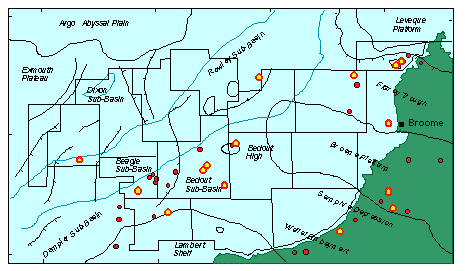 |
 |
 |
 |
 |
 |
||
 |
|||||||
OFFSHORE CANNING BASIN
Northwest Shelf, Australia
Thermal history reconstruction, burial/uplift reconstruction and hydrocarbon generation history assessed using AFTA® and vitrinite reflectance
A new non-exclusive thermal history study using AFTA and VR data
The timing of peak hydrocarbon generation in relation to that of trap formation exerts a critical control on regional hydrocarbon prospectivity. In regions where source rocks reached their maximum maturity levels at some time in the past, accurate assessment of the timing of peak hydrocarbon generation is critical in determining those areas most likely to contain commercial hydrocarbon accumulations.
The onshore Canning Basin is known to be characterised by a series of paleo-thermal episodes, in which hydrocarbon source rocks reached maximum maturities at various times in different regions. Thermal history is therefore likely to exert a critical control on hydrocarbon prospectivity in the region.
For this study, new AFTA and VR data will be collected from ~12 wells from the Offshore Canning Basin region, in order to identify, quantify and characterise the major episodes of heating and cooling which have controlled the development of maturity in the offshore region.
Integration with regional geological information will then provide a consistent regional framework within which the history of hydrocarbon generation in the region can be understood. Specifically, the results of this study will provide unique knowledge on the time at which hydrocarbon generation effectively ceased at the sampled well locations. Coupled with information on timing of trap formation, this allows definition of those areas where traps of a given age are most likely to have been charged.
Project background
Exploration activity in the onshore Canning Basin has revealed numerous small hydrocarbon accumulations generated from Paleozoic source rocks. Previous thermal history studies carried out in this region in connection with hydrocarbon and mineral (MVT) exploration have revealed a series of episodes of heating and cooling, particularly in Triassic-Jurassic and Devonian times. Because of variation in the magnitude of these episodes across the basin, the time at which source rocks reached maximum maturity levels, and hence the timing of peak hydrocarbon generation, shows significant variation across the onshore region.
The relative significance and influence of these events on hydrocarbon generation and migration in the offshore region are not well understood, but are sure to exert a critical control on regional hydrocarbon prospectivity. A rigorous assessment of the thermal history, with particular emphasis on the timing of maturity development, is therefore a vital part of prospect evaluation in this region.
Aims and objectives
The project aims to investigate these problems by direct assessment of the timing and magnitude of paleo-thermal effects in wells from the offshore region. Rather than relying on theoretical models of basin evolution, use of AFTA and VR data in selected wells will allow direct measurement of the various paleo-thermal episodes and their variation across the Offshore Canning Basin.
Specific objectives of this new Geotrack study include:
• identification of the major thermal episodes affecting the drilled section,
• quantification of the timing and magnitude of multiple(?) thermal episodes,
• characterisation of the processes responsible for each episode,
• measurement of paleogeothermal gradients during each recognised episode,
• quantitative assessment of timing of maturation of key source rock horizons,
• estimation of the timing and amount of uplift and erosion at each studied location,
• recognition of any non-burial related thermal effects, caused for example by heat flow variation or fluid movement,
• provision of a regional thermal history synthesis, including history of maturity development and regional variation in timing of peak hydrocarbon generation, together with discussion of implications for oil and gas generation.
This information will allow unique control on maturation histories and hydrocarbon potential in the area.
Proposed work program
The project will be based on approximately 50 new AFTA analyses and ~150 new VR analyses from ~12 wells in the Offshore Canning Basin and the onshore margin. Sample collection will be undertaken in May-June 1998 and sample analyses are expected to be completed by August with the final report complete by October 1998.
Deliverables
The study will be written up in a comprehensive report of two volumes. Volume 1 will provide full details of the thermal history interpretation of AFTA and VR data from each well, while all AFTA and VR data plus supporting geological information will be presented in Volume 2. Results will be presented in an Executive Summary with accompanying summary diagrams and tables. Full details of analytical techniques and information on data quality will also be provided.
For further information, please contact us
